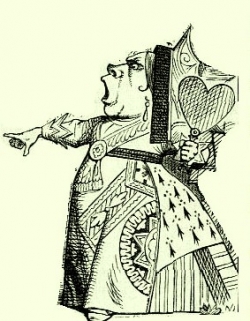
When the google image search was “queen of hearts,” results were dominated by Disney animation and Tim Burton’s makeup department. You need to add “tenniel” in order to ogle the original. Ah, revisionism!
Simplia stood at the kitchen sink peeling the label from a mayonnaise jar. “Because it seems like the bad guys are always the people in power.”
“Funny you should mention,” Sagacia replied from the laundry closet. “Look what I just pulled from the back pocket of your jeans.”
It was a crumpled cash register receipt, on the back of which was written, in tiny script, the following:
Dear Vasilisa the Wise —
Are you really as good as all that? Are you really wise? Or just cagey? When you’re wearing your Czarina hat, are you genuinely concerned about the well-being of your subjects? Or do you just want to pacify them enough that they don’t foment unrest? In your stories, as an innocent, you’re too good to be true. I’m pretty unschooled in fairy tales, so I wonder if there are many stories about you as an woman married to the Czar.
Usually the people at the top of the heap are there either as innocuous place holders or as the source of the conflict that gets the story started. Bad rulers are deposed in fairy tales. Do their usurpers then become the next wave of bad rulers?
Right now, I could use a story about a good monarch. A wise queen. A generous rich man. An honest advisor to the king. Not just a placeholder in the story. Not just a cameo role. I’m looking for a prime mover. Help me out here, would you? I’m growing
Cynical in Cynghordy
“I totally get it,” said Simplia, tossing her mayonnaise jar into the recycling bin. “While the dryer’s running, you wanna head out to the Fairy Tale Lobby and see if any of our Magical Friends can offer our Welsh friend … and me … a fairy tale about someone in power who is strong, kind, and uncorruptible ?”

I am scandalized that anyone would question Vasilisa the Wise! She has become royalty and royalty possess magic. Of what greater authority should we ask of those who live in castles?
I am reminded of Grimm’s The Goose Girl. The goose girl was really a princess who, through personal failings, lost her status, but, because of her birth—possessing magic—the “old king” saw her worth and restored her to her true position.
The point is, the old king recognized her as not a commoner because she raised a wind to blow off poor Conrad’s hat and he needed to chase it, leaving her in peace to comb her hair. Commoners do not have magic. (Her nemesis died in a barrel lined with nails, but that’s a different point.)
In modern western terms, royalty have become symbolic figureheads of state where they have survived at all. The real royalty are now the rich. We now give them the same respect, deference, underlying hostility, and assumption of special wisdom that earlier commoners extended to the kings, queens, princes, and princesses.
I find myself begging the question: Do the rich possess magic? Well, how do they make so much money? Are they turning lead into gold? As I understand it, the rich do not horde wealth, they create wealth. Does that not sound magical?
Who are we, the commoners without magic, to judge the actions and ethics of the new royalty?
As my words echo away from me, down the dark castle corridors of argument, I become less fond of them. Perhaps Cynical in Cynghordy should retain their skepticism and I keep my mouth shut.